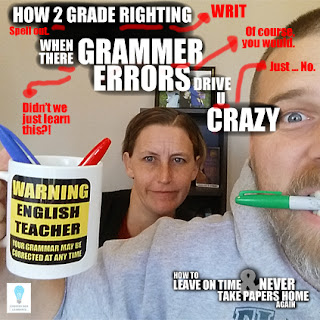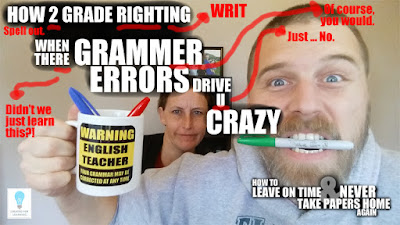Today, we’re having a conversation about all those grammar errors in student essays and how to save hours of time and our sanity while grading them.
Watch the YouTube video here >>> https://youtu.be/Nq9OQy4Vwmc
It’s soooooooo difficult. We know the feeling. We’ve got the stack of essays in front of us and an enormous mug of coffee (or some other beverage of sanity). And we’re grading, grading, grading … not at home, of course, because we drew that permanent line in the sand back in Episode 3.
And this feeling overcomes us … we can’t even help ourselves … there is a huge disturbance in the force and it’s the grammar errors in this essay. And this one. And this one. Okay, almost all of them.
And we feel like we need to fix them all. And we have good reasons that we think we need to fix them:
- The learners need to know how to use correct grammar in life or they’ll get mocked on TV or social media or won’t get hired.
- Some learners have even told us they actually want to know the errors they made.
- If we leave a grammar error uncorrected, it means we think it’s okay for them to use incorrect grammar.
- If we leave a grammar error uncorrected, another teacher or parent or admin might see it and think we’re incompetent.
- We need to prove to our students (and parents!) the reason they earned the grade they did, and if we don’t mark up a whole bunch, they’ll think they deserve a higher grade.
- They won’t know what to fix if we don’t tell them.
And these reasons and any others in your mind might all be true, to some extent. But they can all be overcome, and none of them are reasons to grade grammar in every essay you grade.
So let’s talk about when we SHOULD grade the grammar and when we SHOULDN’T.
To do that, we need to separate the steps of the process and actually see each step as separate. Ideating is not outlining is not drafting is not editing is not publishing. And there’s only one step in the process that we the teachers should care about their grammar (maybe).
Because worrying about grammar KILLS THE IDEA PROCESS for many people. Ideating and editing MUST BE KEPT DIFFERENT. All those marks on their paper just tells them that their ideas suck and kills the creative energy. It kills their desire to play, to explore, to idea adventure. It makes them afraid to get their ideas down on paper because their ideas might be wrong … even though we know wrong grammar doesn’t mean wrong ideas, they don’t feel that when they see all the marks.
And that’s because the ideas and the grammar ARE DIFFERENT parts of the process. All the first stages of the process are about helping them get their ideas onto paper and into better and better flow, better logic, better persuasion … all that. And if we have them thinking about their spelling and commas and all that crap, then we kill them.
But wait, wait, even back in 2nd grade my learners were being tested on their grammar. On the test they have to do all the stages in one sitting and they only have one shot.
You’re exactly right. That is the one stage of the process when the grammar absolutely matters and needs to be correct … when they publish. And testing is one of those times. The publishing stage is last. And we have to scaffold them to that level. That’s one of the bummers of testing is that very few places in real life do we have such a rushed and pressurized writing process. It doesn’t equip them for a real life scenario, but it does equip them for the real life process.
So what you’re saying is in all the time when you’re training them through how to ideate, outline, and draft, you’re not worrying about grammar and spelling. They can still get it right when they can, but we’re not going to WORRY about it in those stages because those stages are about the ideas.
Yes, then once we’ve got the thing written and our ideas revised, then we can polish things up and make them pretty. That’s when we take the thing to publish. But that’s also where the in-house state testing process messes things up and stops modeling real life.
Okay, so let’s go deeper on the idea of polishing. When we were talking the other day in the car, you went pretty deep on that process.
Yeah, it’s a process I’m passionate about because I’ve learned it the hard way while writing and editing my four unpublished novels. We often combine the revising and editing stages into one stage, and they need to be kept separate whenever possible. And I think it’s focusing on and fixing the spelling and grammar that combines the stages. I call that polishing things up. Polishing is when we’re making things pretty so we can publish.
But the revising stage isn’t there yet. Is that what you’re saying?
Revising is just that a re-vision. We have to be able to look at the ideas and the structure and flow and validity and persuasiveness of the ideas in order to see what to keep, what to tweak, what the sledgehammer, and what to trash completely.
And that’s where spelling and grammar makes it hard to edit. When we focus on fixing all those little grammar parts in the revising stage, we’re polishing our sentences up and it makes it really hard to then tweak, sledgehammer, or trash them.
Because we’ve made them all pretty. And I could see how it could make you frustrated too because all that grammar and spelling editing would end up a waste of time if you later deleted the sentences, paragraphs, or complete pages.
Exactly. It feels like a waste of time. But even worse, I think, is that it distracts your idea flow with a completely different mental process … editing. Ideating and editing are completely different. Right brain vs. left brain. It’s hard enough to use our brains, so let’s keep ourselves in one hemisphere.
I love that … because we’re teaching them how to think … literally … How they can maximize their thinking energies and flow into one side of the brain at a time.
Yes. I think it’s vitally important.
Then after they’ve finished the whole process and are getting ready to publish, that’s when you could focus on all the grammar or maybe just focus on the most recent grammar you taught: “On this essay, you’ll be graded on your comma usage with compound sentences. Make sure you use 10 commas with coordinating conjunctions … or something like that.”
I like the sound of the process. Feels super clear.
Conversation of the Day: What grammar or spelling error do you compulsively feel you have to correct?
Hop on over to watch the video and share your thoughts in the conversation.











